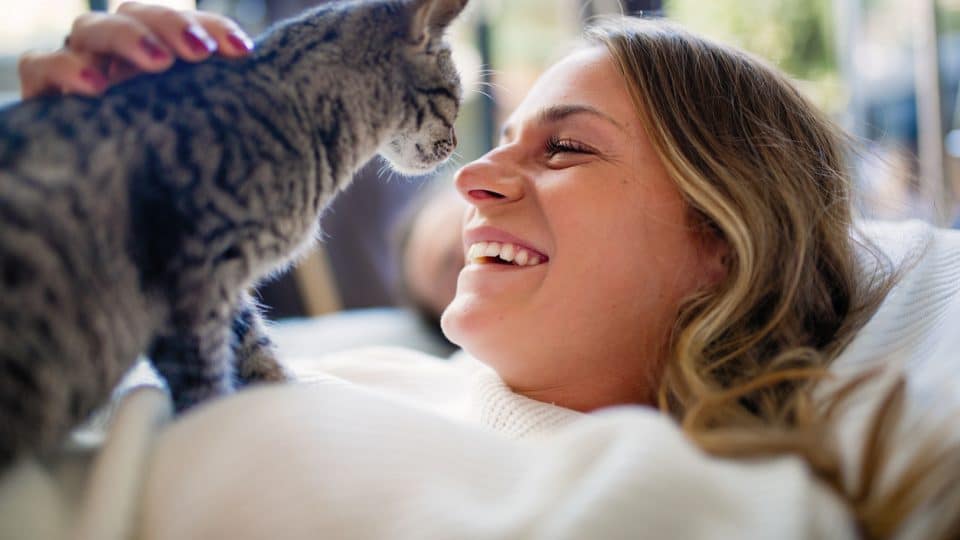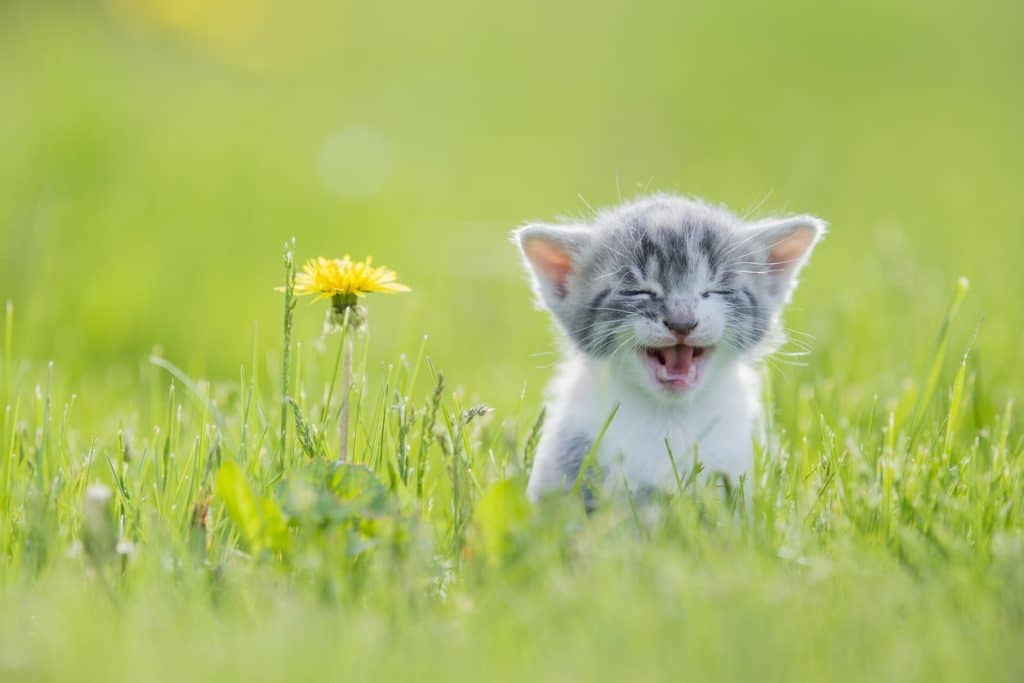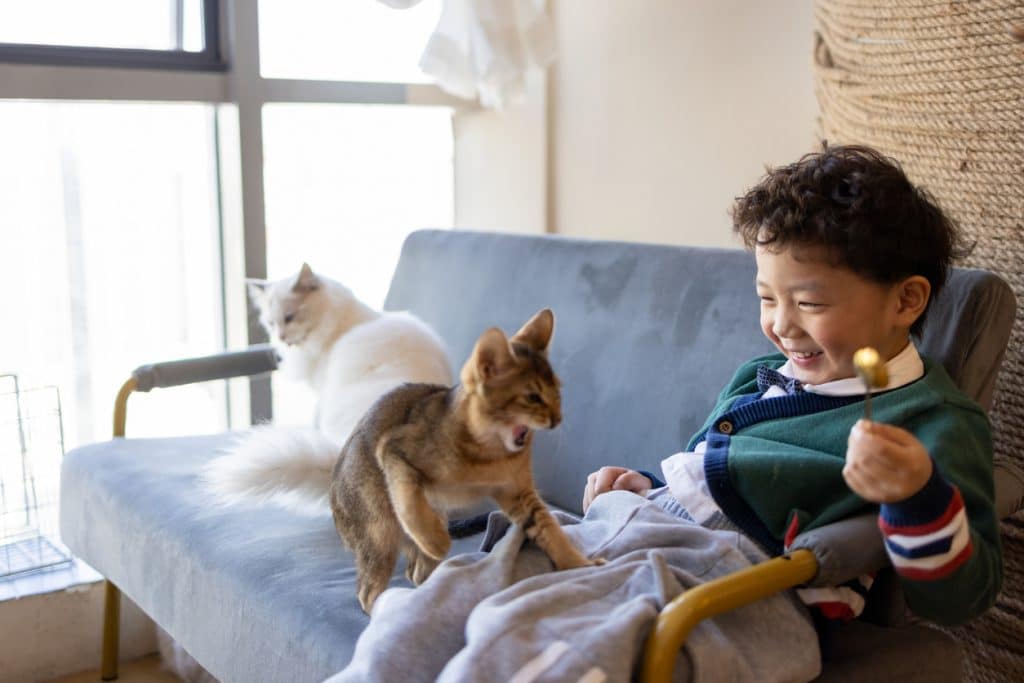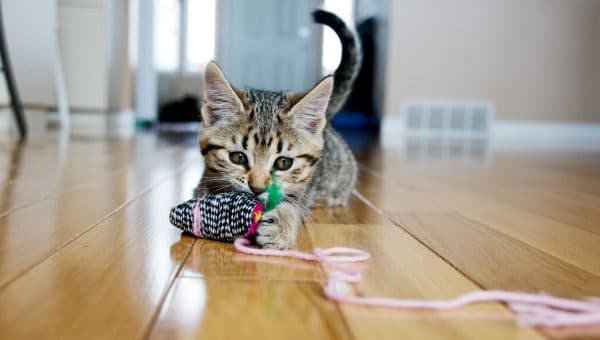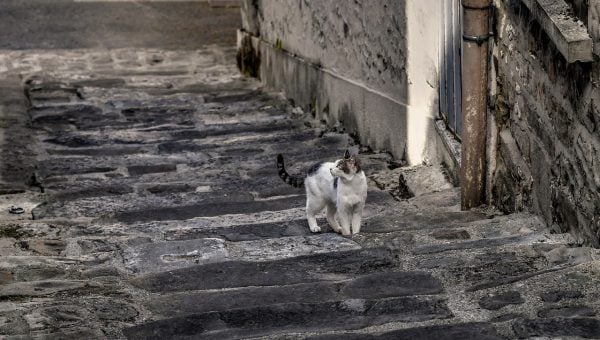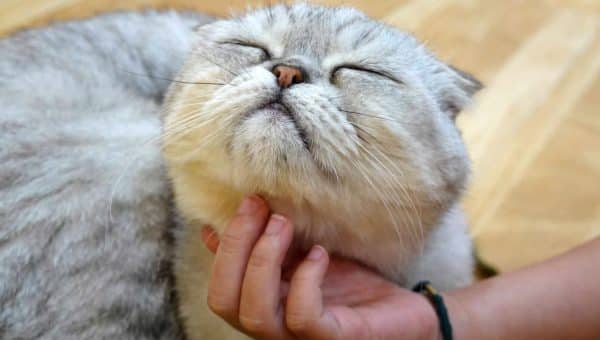It may be disappointing to learn, but your cat cannot laugh. And it’s unlikely they’ll see the funny side of your best jokes, either. But, just because your cat doesn’t laugh in the strictest sense, it doesn’t mean they can’t express their happiness in other ways. Cats make all kinds of funny noises, from purrs to chirps, and it can be hard to know what these mean. That’s why we’ve delved into the science behind the sounds.
What Is Laughter? And Which Species Can Laugh?
Laughing is wonderful and it’s not just people who do it. A 2021 study found that 65 other species laugh as well. According to the study, published in the journal Bioacoustics, researchers at UCLA (University of California Los Angeles) found that most primates, bottlenose dolphins, and even mice laugh (just ultrasonically). As summed up by the journal LiveScience, “many animals produce sounds during play that are unique to that pleasant social interaction; researchers consider such vocalisations to be a close analogue of human laughter”.
It’s important to note that these researchers defined laughter as “play vocalisations” to ensure that species which can’t laugh like humans—but still express joy through similar noises—were recognised. Domestic cats were included in this study and, though it found that the species do not exhibit “play vocalisations”, anyone who lives with felines will know that some seemingly use noise to express happiness.
Why Can’t Cats Laugh?
While a cat isn’t physically wired to laugh, it doesn’t mean that they aren’t capable of expressing or recognising similar feelings. Purring, the “slow blink”, trilling, and even how your cat’s tail moves, can all be indicators of happiness in kitty language.
Signs your cat is happy, healthy and having a good time
- Body language: if your cat is healthy and happy, you’ll know by their relaxed body language.
- Activity level: if your cat sleeps a lot but has regular bursts of activity, this is normal and fantastic. And probably funny, too.
- Good appetite: a cat with a healthy appetite is generally a happy cat.
Tips to deepen the bond you share with your cat
A cat’s happiness can depend on having a solid bond with their owners, as well as other animals who might share their home. Some great ways to bond with your cat include:
- Focused playtime: just a few minutes a day of focused playtime with your cat reinforces your bond and is great for their physical health.
- Grooming: brushing, combing, and even massage are great ways to let your cat know you care—and to check for parasites like fleas, injuries or abnormalities.
- Treats: giving your cat treats is just a nice thing to do!
- Cuddle time: snuggles with your cat (on their terms) can make them happy, as well as being good for your own health.
Does Your Cat Know You’re Laughing At Them?
Cats are funny creatures, but there’s no scientific proof that they have a sense of humour like humans. So, it’s unlikely that your cat will react to being laughed at. If they respond, it’s probably because you’re paying them attention rather than your laugh. This is mostly a positive thing, but some cats react to loud noises or perceive their owner pointing a finger while laughing as a threat. In these situations, a cat might display a fear response—hiding or hissing to express displeasure at the noise or action. If so, you’ll need to adjust your behaviour so that it isn’t something your pet is threatened by.
My cat hisses at me when I laugh
- If your cat is hissing at you when you laugh it probably means there is something about your behaviour that feels threatening to them. You may need to adjust the volume of your laugh or be conscious of the movements you make when giggling. Or, it could simply mean that your cat doesn’t like your laugh. Cats are picky, after all.
My cat hides when I laugh
- If a bout of giggles drives your cat into hiding it’s probably because there is something about the noise or actions associated with your chortle that makes them uncomfortable. If this happens, be aware of your laugh, its loudness, and your actions to reduce your pet’s stress.
My cat does nothing when I laugh
- If your cat doesn’t respond to your laughter, that’s ideal. This means your cat is comfortable and secure with you, no matter how noisy and strange you might sometimes appear to them.
Convinced Your Cat “Laughed”? Four Noises Easily Mistaken For Laughing
As we’ve established, cats make all kinds of funny noises but this doesn’t mean they are always having fun. If your cat suddenly begins to make laughing-like noises you “should talk to your veterinarian as soon as possible because the cat might be coughing or having difficulty breathing,” notes Dr. Mikel Delgado, a Certified Applied Animal Behaviourist and Certified Cat Behaviour Consultant who has been working with cats for more than 20 years. Some of the typical laughter-type sounds you might hear from your cat include:
- Coughing: as Dr. Delgado says, coughing can sound funny but it can also mean there is an issue. Cats can cough if they’ve got something stuck in their throats or if they are suffering from an upper respiratory infection. If your pet suddenly starts coughing, it’s a good idea to get them checked out by a vet.
- Retching: sometimes called “horking” by cat people, retching means your pet is trying to get something out. This will usually be a hairball, which is a completely normal thing for a cat to hork up. If your kitty is retching and nothing is coming up, or is vomiting, these are signs something could be wrong. Often, it’s the result of an upset tummy but could also be a sign of other underlying issues such as irritable bowel disorder. Again, it’s a great idea to have your vet check it out.
- The “man man” noise: this is hard to explain, but the “man man” noise, which sounds something like this (with many variations), is generally considered an expression of pleasure and can sound a lot like laughing. Usually, this just means your cat is enjoying whatever is happening, from petting to eating, and you get the joy of getting a laugh out of it yourself.
- Chirping: that sound your cat makes when it sees a bird or squirrel outside your window generally signifies excitement. All cats are different, so sometimes this can sound less like a chirp and more like a laugh (and looks like one too!)
Just because cats can’t physically laugh like us, it doesn’t mean they don’t experience the same kind of joy. If your cat is being funny and it elicits a positive response from you, that’s probably the point of the behaviour. So encourage it—being silly and having fun is good for us all.
